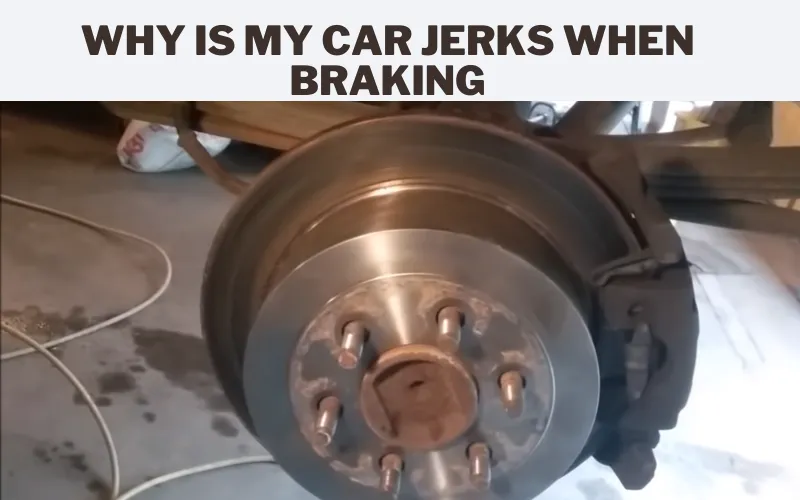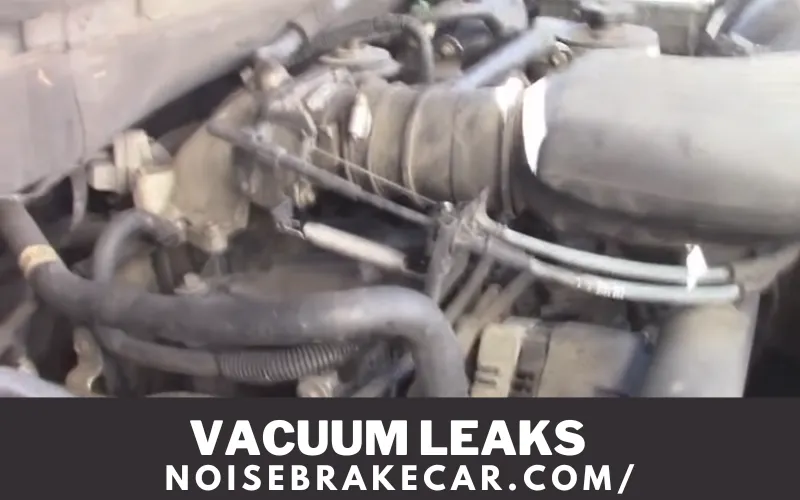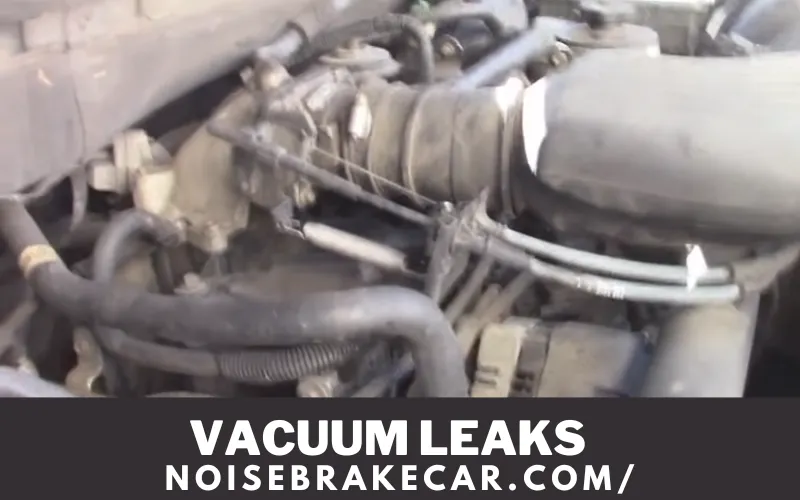Usually, the car shakes or wobbles while driving due to worn or un balanced wheel. However, if your car jerks when braking, this is a clear sign of a faulty braking system. It can also happen due to unbalanced brake rotos, dirty brake pads, warped brake rotos or even poor driving behaviour.
If you experience a jerk or shaking sensation when braking, accelerating, or decelerating. Don’t worry explained in this article about car jerks when braking. what are most common reasons read below.
Do the Easy Things First?
Consider possible causes of vehicle shock that are not related to the braking system.
Perform Brake system Diagnostics
If the brake lever vibrates, this may indicate a fault in the vehicle’s steering components. There are probably problems with the brake pedal. In very rare cases, problems with worn or damaged bearings can occur.
It could actually be a matter of driving skills! If we need to get rid of the problem first, this will give us some ideas on how to fix the vibrating brake problem. First, we need a brake.

Worn Tires
The defective tires do not have enough tread to be comfortable. Depending on how you drive an automatic transmission vehicle, unbalanced tires can cause jolts when braking.
Checking tires wear is very easy. This is important for security. So be careful if you have problems with your brakes. If the problem of jerking, especially when pressing the brake pedal, is not resolved, you should consider another option.
Car With Manual Transmission
The automatic transmission can feel sluggish at braking speeds, especially for a novice driver with a manual clutch. If the vehicle does not move properly at low speed, the car will be forced to bounce.
To downshift properly, the clutch driver must coordinate the operation of the brake pedal, clutch pedal and shift lever. If you are not very good at this, your car may suddenly stall. The only solution is to learn how to use the manual transmission clutch through practice.
Check the Floor Mats
Sometimes the mat slips and hinders the operation of the brake lever. If the transmission clutch pedals do not move properly, the vehicle may vibrate.
Such problems can be easily solved by removing the mats. If you feel it creasing or getting worse, remove it or replace it with another one. As a quick fix, you can replace it with a seat mat.
Is the Problem with the Front or Rear Brakes?
Although there is no absolute rule, problems with the front brake are noticeable on the handlebars. If you notice tremors in your hands, pedals or feet, the problem probably started with a teething problem.
As the vehicle’s weight shifts toward the brakes, the front brakes are likely to absorb the majority of the braking force. The rear wheels have less braking power and can support up to 90% of the vehicle’s weight when braking.
Experience has shown that problems with the rear brake are usually due to the seats. If you do not know why you are shakes or jerks when you brake, think about when it happened.
Brake Calipers can become sticky
If your brakes are leaking, there is probably a piston I them. Over time, the rubber rings of the brake caliper wear out and fluid can leak through the sidewall. Loss of hydraulic power can result in uneven pad wear.
Brake fluids have hydrophobic properties that attract water, which can lead to corrosion on the brake piston. This can ten reduce piston pressure and ultimately lead to uneven pad wear. These uneven brake pads cause the brake to vibrate when you step on the brake.
6 Causes of a Car that Jerks When Braking
It is not uncommon for drivers to experience a “jump” when braking. Although these types of problems are not uncommon, fixing them requires a lot of attention.
Consider possible causes of vehicle shock that are not related to the braking system.
1) Warped Rotors
Warped brake discs are the main cause of a clicking feeling when braking a vehicle. Over time your vehicle’s brake discs can become warped due to overheating, excessive wear or rapid cooling.
This deformation can be felt when the vehicle’s brake pads press against damaged brake discs, causing a noticeable pulsation.
2) Electrical and ABS Problems
Most care today are equipped with anti-lock brakes. ABS is an electrically controlled braking mechanism that prevents the brakes from locking during traction. For example, ABS can modulate hydraulic pressure to quickly drain and replenish brake fluid.
This helps you maintain control of the vehicle when you slow down. There is no need to press the pedal with a manual transmission, vibrations can occur in the brake pedal. Without the brakes, the braking system would not the work, the wheels would not the turn and you would lose control of driving. Depending on how the ABS value works in your car’s engine.
You May experience a noticeable jolt when braking, if you try to brake suddenly, especially in the rain, this not a problem. If your vehicle’s ABS system has automatically shut off before detecting this, further diagnostic testing is required for proper operation.
3) Plumbing problems
Most cars are designed to operate with closed hydraulic brake circuits. The cylinder (drum brakes) is the heart of the system and responded to manual braking by the driver. In the master cylinder, hydraulic fluid flows through the brake lines to the individual piston.
The hydraulic fluid is not compressed by the brake pressure and the braking mechanisms are activated when you press the pedal and force the fluid into the brake parts. Sometime air can get into the hydraulic system and irritate the Fail brakes.

4) Problems With the Brake Booster
Modern cars are often equipped with a brake assistant that makes braking easier. Most Passenger cars are equipped with vacuum brake boosters connected to the engine to increase pressure, while heavier truck engines use power steering pressure instead.
Thanks to a powerful assistance system that increases braking power during sudden braking maneuvers, it helps the driver brake more effectively. Failure or failure of this component can cause the vehicle to jerk when braking. At some point the old ones will be replaced.
5) Brake Calliper Blocked
If brake pads fail, vehicles can also vibrate when braking and applying pressure. The most common cause of jerking and jumping is brake pads getting stuck in the corresponding rotating gears.
6) Steering/suspension bushings worn
It can also be integrated into the suspension/connection system using various rings. However, over time, bushing tend to wear and increase noise attenuation. This usually happens when braking.
6 Causes of a Car That Jerks When Slowing Down
The vehicle may also jerk when braking, even if no targeted braking is carried out. The cause of this unusual vibration should be isolated and repaired as much as possible.
Below are some of the most common reasons why your vehicle shakes when braking to a stop.
1) Compromised ignition Coils
The engine’s ignition coil produces sparks on each s piston at the right time.
However, when ignition coils fail, misfiring can sometimes occur at low-speed ranges, often heard as a clicking or jumping noise.
While they can occur when driving al low or high speeds, these problems are generally much more common when acceleration is much slower than engine load
2) Defective MAF Sensor
In some cases, faulty air sensors cause the engine to jerk when braking. The ECM/PCM sensor provides the engine with information about the amount of air flowing through its system. Helps to determine the real-time fuel consumption of your vehicle and its equipment.
However, incorrect information can lead to problems with the internal combustion engine.

3) Throttle Body is Stuck
Sometimes the throttle bodies wobble when the engine starts to stall. Generally, the throttle body is used to measure the gases sucked in during combustion. If the throttle bodies are stuck or other mechanical components are not responding to the engine’s demands, some delay will usually occur.
4) Vacuum Leaks
One of the main causes of the vehicle shaking or jumping when braking and decelerating is a large vacuum leak. In older vehicles, engine vacuum was sometimes used to perform several important functions.
Additionally, a leak in the intake system can cause rough idling or misfiring, which most commonly occur at idle.
5) Transmission Problems
The jerk feeling when decelerating to a stop often indicates a transmission problem, such as a damaged value body or TCM.
This applies to both automatic and manual transmission as its attempts to adjust gears and speed depending on the situation. Further diagnosis is required to reveal the full extent of these problems.
6) Compromised ignition coils
The engine’s ignition coils produce a spark at the right time for each cylinder. However, when the ignition coil begins to fail, it often results in misfiring at low speeds, often heard as a clicking or popping noise.
Such problems can also occur at high speeds, but jerks occur much more often when accelerating because the relative load on the engine is significantly reduced.
3 Causes of a Car That jerks When Stopped
However, sometimes the vehicle may swerve and sway and shake after stopping. This cause a bit of panic and can be quite frightening. Below are some common causes of idle jerking.
1) Fuel Supply problems
If possible, the car sometimes suns out of fuel due to faulty systems via the installed post navigation search engine. Additionally, clogged fuel pumps, faulty fuel injectors causing rough idle and faulty fuel pumps can causes fuel system malfunctions.
Most of these problems can be spotted while sitting in crowded parking lots or at red lights.
2) Ignition System Issues
An occasional jerk and jerk when idling can often be caused by an ignition problem with the lights on, some of the most common problems include a worn spark plug wire, an outdated spark plug wire, or damaged coils. In older vehicles, the causes were often a worn or damaged brake knob cover.
3) Ineffective Air Supply
The internal combustion engine requires a constant supply of clean intake air to ensure proper operation. If the engine runs out of air at any time, combustion efficiency and overall power will be significantly reduced, usually resulting in serious misfires.